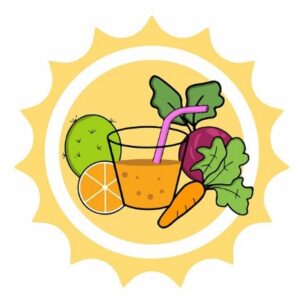Table of Contents
What is detoxification of the organism?
Detoxification of the body, or abbreviated detox, is a natural, permanent process of neutralization and elimination of toxins.
Toxins are substances that can potentially damage tissues in the body. These are waste products that are formed during normal cell activity, and chemicals that are found in our environment, food, and water. The liver, intestines, kidneys, lungs, skin, blood, and lymphatic systems transform toxins into less harmful compounds and excrete them from the body.
If the term “detoxification of the organism” evokes in you a 7-day treatment with juices from fruits and vegetables, it’s time to reconsider everything you thought about detoxification. Detox does not require any extremely large sacrifices when it comes to eating, because our body gets rid of toxins naturally.
How does detoxification of the organism work?
Cleansing diets, herbs, and fasting may seem like a modern trend, but this key to health has existed for thousands of years. The detoxification that cultures have practiced for centuries – including Ayurvedic and Chinese medical systems – is about rest, cleansing, and nourishing the body. By removing toxins and then eating healthy nutrients, detoxification can help protect you from disease and restore your ability to maintain optimal health.
Detoxification of the body means purification of the blood. This is done by removing impurities from the blood in the liver, where the toxins are processed to eliminate them. The body also removes waste products through the kidneys, intestines, lungs, lymphatic system, and skin. However, if these systems are disturbed, impurities in the body are not properly filtered and thus adversely affects.
A detoxification program can help the natural process of cleansing the body and should include:
- relieving organs through fasting
- stimulation of the liver to excrete toxins from the body
- support elimination through the intestines, kidneys, and skin
- improving blood circulation
- refueling the body with healthy nutrients
A little about toxins
The toxin is a poison that is produced by biological processes. The nicotine found inside tobacco leaves is a toxin; so is the metabolic waste produced by cells inside the human body. But when we talk about “toxins”, it also applies to synthetic chemicals.
When our body eats food, water, and breaths, it can accumulate both natural and artificial toxins. This cumulative burden on the body can lead to disease and is associated with hormonal imbalances, impaired immune function, and nutritional deficiencies. Symptoms include indigestion, poor concentration, fatigue, headaches, shortness of breath, dull skin, and muscle aches. Air pollutants such as ozone and nitrogen dioxide are also associated with several health problems – from airway inflammation to cancer. Water pollutants include arsenic, a known carcinogen, and mercury, which is associated with disorders of the nervous system.
Toxins include pesticides, antibiotics, and hormones in food, food packaging chemicals, household cleaners, detergents, food additives, heavy metals, pollution, drugs, and cigarette smoke.
How our body’s “built-in” detoxification system works
The main organ that helps the detoxification process is the liver. Everything you eat or inhale is absorbed into the bloodstream and passes through the liver, which is the largest internal organ. Our body is dependent on liver function, which regulates, synthesizes, stores and excretes many important proteins and nutrients, as well as cleanses, transforms, and removes toxic or unnecessary substances.
Many detoxifiers claim to “cleanse” the liver, but in healthy individuals, toxins are not stored in the liver. In the past, the liver converts potentially harmful chemicals into water-soluble chemicals that can sweat or be eliminated from the body.

The liver usually does an “excellent job” in detoxifying our bodies
However, there are a few exceptions to this rule. People with certain liver diseases – such as viral hepatitis (Hep A, B, or C) or alcohol-induced liver disease – do not have a healthy liver and toxic substances can accumulate in their bodies. Some substances that can be toxic at high doses, such as vitamin A, iron, and copper, can also accumulate in the liver or other organs due to the disease. However, there is no scientific evidence that detoxification or cleansing of the liver helps to treat liver disease.
Some proponents of “liver cleansing” argue that liver cleansing products help the liver remove toxins more effectively. There are no convincing studies to support these claims, although some studies support the theory that certain foods and herbal supplements may promote liver health.
How do we know it’s time to detoxify the body?
Have you ever thought about detoxification, but hesitated, didn’t know which way to choose or whether it was the right decision for you?
Detoxification of the body is not about starving or skipping favorite evenings with a good meal with family and friends. Rather, it focuses on elimination diets – a diet that rids the body of common allergens and inflammatory foods and the addition of detoxifying nutrients that support liver function (the body’s main detoxifying organ) and nutritional supplements that eliminate harmful bacteria in the gut and promote healthy digestion.
So, how do we know it’s time to detox?
- You feel sluggish and feel the need to recharge – if you are tired, do not have the energy to live your daily life in a positive mood, it may be due to your eating style. The detoxifier cleanses your system of foods that deprive you of energy and gives your digestive system a new charge.
- Being overweight, feeling swollen, and bloated – if you want to lose weight in a way that nourishes your body and gets you on the right path of long-term changes in habits, detoxification can be a great choice. By eliminating foods that trigger weight gain and finding healthy replacements, you set out on a path to sustainable weight loss.
- You feel that you have slowed digestion – Our good health starts in the gut, and if digestion doesn’t work, it affects you in more ways. For example, you suffer from constipation, bloating, flatulence and indigestion.
- You have irritated skin – your skin is a mirror of the inner state of your body. Skin problems are often the result of inflammation in the body, so detoxification is also appropriate here.
For whom detoxification of the organism is not suitable
If you are considering detoxifying the body, consult your doctor first (it may be harmful to people with certain conditions such as diabetes). Detoxification is not suitable for pregnant and breastfeeding women as well as children.
Fatigue, indigestion, cough, muscle aches and poor sleep may be signs of an underlying medical condition. If you have long-term symptoms, make sure they are not caused by a condition that requires medical attention. Self-examination, delay, or complete neglect of standard care can have serious consequences.
How to start detoxification?
- First, relieve the body of toxins. Eliminate alcohol, coffee, cigarettes, a diet rich in refined sugars and saturated fats that act as toxins
- Minimize the use of chemical household cleaners and personal health care products (shower gels, shampoos, deodorants, and toothpaste). Replace them with natural alternatives.
- Another obstacle to good health is stress, which is the trigger for the release of stress hormones into your system. Although these hormones can also provide an “adrenaline rush” to win races or meet deadlines, they produce large amounts of toxins and slow down the detoxification of enzymes in the liver. Yoga, Qigong, and meditation are simple and effective ways to relieve stress.
7 simple ways to detoxify the body at home or recipes how to do it
-
Reduce your sugar intake
Start by reducing the amount of sugar you consume. This includes honey, molasses, and artificial sweeteners. The more sugar you eat, the more insulin you ask for from your body, strain your pancreas and run out. Sugars are simple carbohydrates that are digested very quickly and then sharply increase blood sugar levels. In the long run, you can induce chronic fatigue, diabetes, develop cancer and gain extra pounds.
-
Start the day with water and lemon
When you wake up, drink a glass of warm water with squeezed fresh lemon. It provides your body with hydrating electrolytes in the form of potassium and calcium. At night, the body takes care of its detoxification processes. It is so important to hydrate and “replenish fuel” in the morning. Lemon juice also helps your liver produce more enzymes that help digestion and stimulate the liver to cleanse toxins. Vitamin C in lemon juice, a powerful antioxidant, protects against free radicals and strengthens the immune system.
-
“Move your body” – practice!
Regular exercise promotes circulation in the blood and lymphatic system. It also promotes digestion, reduces tension, lubricates joints, and strengthens your body. Exercise is an important part of any detoxification program. Body movement creates conditions for the body to breathe, stretch and sweat. In addition to exercise, increase fluid intake and the kidneys can effectively filter toxins. By increasing your water intake, as well as increasing your heart rate and respiratory rate, your body can flush out unwanted toxins, fats, and waste more efficiently. It proves that “People who exercise regularly have much fewer toxins in their bodies.”
- Drink a lot of tea
Not only are teas full of antioxidants and hydrating (especially if they are herbal), but they also provide a feeling of satiety. This means you are less likely to overeat. Keep in mind that the caffeine in tea is different from the caffeine in coffee – it is more gentle on your body. NO, also dandelion or thistle supports liver activity that protects against damage to cells and stimulates regeneration of liver tissue. Cancer studies suggest that thistle can strengthen cell walls, preventing the ingress of toxins, stimulating enzymes that neutralize toxins, and blocking free radicals.
-
Detoxify with food – Eat organically
Reconfigure your diet. Colorful varieties of fruits and vegetables should be the main focus of your diet along with whole grains, beans, legumes, and a small number of nuts and seeds. You should eat raw plant foods because they do not have the nutrients your body needs. For example, dark green vegetables are full of micronutrients and have very low-calorie content. Reduce the risk of chronic inflammation associated with heart disease, diabetes, and cancer by filling your plate with sulfur-rich foods such as onions, garlic, and cruising vegetables including broccoli, cabbage, and cauliflower. These foods are high in antioxidants, which support the body’s ability to fight toxins. Recipes on how to conjure up tasty food are easy to find on the internet and in magazines.
-
Sweat in the sauna
Thanks to a sedentary lifestyle and air conditioning, most people in the modern world do not even sweat much. As a result, the pores of the skin become clogged with non-sweaty toxins. So you are constantly in a “polluted environment” due to your skin, which can damage your organs and body systems. Sweating supported by a sauna can help your body enjoy the waste generated and harmful toxins. Did you know that alternative medicine considers sauna detox to be a treatment? As the world becomes more natural and self-regulating treatments, sauna detoxification is gaining more and more attention.
-
Feel good in your skin – exfoliate
Massage the skin several times a week before a bath or shower with a soft brush or loofah glove. Dry peeling has two main benefits – it helps your skin get rid of old cells and toxins, loosen pores, and allows the skin to breathe freely. It also stimulates circulation under your skin, which helps promote cell renewal and vitality. If you prefer a classic peeling, sea salt in combination with quality cold-pressed oil will guarantee you the same effects. If salt on your skin stings you, you can replace it with finely ground coffee.
10 benefits of detoxification of the organism
-
Increases energy
– It makes sense because, during the detox, you stop the influx of things that made you need it at all. It is important to follow a drinking regime because it is also a source of increased energy.
-
Helps to lose weight
– It’s nice to know that thanks to a detoxification program, you will lose weight in the short term, but a healthier way would be to establish long-term eating habits and get rid of the unhealthy ones permanently.
-
Stronger immune system
– When you detoxify your body, your organs start working as they should. This will support the immune system.
-
Better skin quality
– You can expect clearer and smoother skin, less acne, but in this case, the condition may be worse first when toxins begin to be released.
Tip: Learn 4 steps easily like a daily routine for a glowing skin
-
Pleasant breath
– Of course, detoxification of the body also includes the large intestine, which contributes to bad breath. When it cleans up and your digestive system starts working again, you will find that your breath changes, it improves.
-
Promotes healthy change
– It’s hard to change long-term habits, and a detox program is one way to drive a wedge between the old and the new. If you detoxify your body and replace your foods with healthier options, you will probably stick to your new habits.
-
Clear mind
-A good detoxification program will pay some attention to the state of your mind during cleansing. Meditation is often recommended. The experience is such that the feeling of the obscurity of the mind is lost. It makes sense because the amount of foods full of sugar and fats that attack us every day makes us feel lethargic and can hardly affect the quality of our thinking.
-
Healthier hair
– When your hair can grow unpressed by internal toxins, you will see and feel the difference. The hair acquires a shine and is softer to the touch.
-
Anti-aging effects
– The constant barrier of toxins that the body has to deal with contributes to the aging process. Switching to a healthy diet and an active lifestyle is a great way to feel good every moment of your life.
-
Feel well-being
– When you detox, you feel good, and when you feel good, good things happen. All areas of life will improve, you will see that productivity has increased and a new zest for life has come.
Does detoxification of the body have side effects?
The side effects depend on the detoxification program and its duration. They include the following manifestations:
- You may feel hungry and weak without energy
- low blood sugar – dizziness
- One of the side effects is headache during the first days of detoxification. It is often the result of caffeine withdrawal
- diarrhea, which can lead to dehydration and electrolyte loss
- Constipation – If you consume excessive amounts of fiber without increasing your fluid intake
- If the detox is longer, it can result in low body weight and a lack of nutrients, especially protein and calcium
The best detoxification of the body is the one that suits you. Whether it’s a natural detox with maple syrup, aloe vera, saltwater, or relying on homemade recipes, it’s up to you. It can be seasonal – in spring or autumn. Whatever you decide, the important thing is that you are ready to do something for your health. Nutritional supplements designed to detoxify the body will help you in this endeavor. They are 100% natural products proven for centuries.
Top 5 recipes for detox smoothie
Because detoxification smoothies are a chapter in themselves, we have prepared a special article for you, where you will find the top best detoxification smoothies that will help you cleanse your body of toxins, feel better and start your body in the right direction. If you are interested in this post, click here.













